Zhi Gao
School of Remote Sensing and Information Engineering, Wuhan University, Wuhan, China
RoboGene: Boosting VLA Pre-training via Diversity-Driven Agentic Framework for Real-World Task Generation
Feb 19, 2026Abstract:The pursuit of general-purpose robotic manipulation is hindered by the scarcity of diverse, real-world interaction data. Unlike data collection from web in vision or language, robotic data collection is an active process incurring prohibitive physical costs. Consequently, automated task curation to maximize data value remains a critical yet under-explored challenge. Existing manual methods are unscalable and biased toward common tasks, while off-the-shelf foundation models often hallucinate physically infeasible instructions. To address this, we introduce RoboGene, an agentic framework designed to automate the generation of diverse, physically plausible manipulation tasks across single-arm, dual-arm, and mobile robots. RoboGene integrates three core components: diversity-driven sampling for broad task coverage, self-reflection mechanisms to enforce physical constraints, and human-in-the-loop refinement for continuous improvement. We conduct extensive quantitative analysis and large-scale real-world experiments, collecting datasets of 18k trajectories and introducing novel metrics to assess task quality, feasibility, and diversity. Results demonstrate that RoboGene significantly outperforms state-of-the-art foundation models (e.g., GPT-4o, Gemini 2.5 Pro). Furthermore, real-world experiments show that VLA models pre-trained with RoboGene achieve higher success rates and superior generalization, underscoring the importance of high-quality task generation. Our project is available at https://robogene-boost-vla.github.io.
STVG-R1: Incentivizing Instance-Level Reasoning and Grounding in Videos via Reinforcement Learning
Feb 12, 2026Abstract:In vision-language models (VLMs), misalignment between textual descriptions and visual coordinates often induces hallucinations. This issue becomes particularly severe in dense prediction tasks such as spatial-temporal video grounding (STVG). Prior approaches typically focus on enhancing visual-textual alignment or attaching auxiliary decoders. However, these strategies inevitably introduce additional trainable modules, leading to significant annotation costs and computational overhead. In this work, we propose a novel visual prompting paradigm that avoids the difficult problem of aligning coordinates across modalities. Specifically, we reformulate per-frame coordinate prediction as a compact instance-level identification problem by assigning each object a unique, temporally consistent ID. These IDs are embedded into the video as visual prompts, providing explicit and interpretable inputs to the VLMs. Furthermore, we introduce STVG-R1, the first reinforcement learning framework for STVG, which employs a task-driven reward to jointly optimize temporal accuracy, spatial consistency, and structural format regularization. Extensive experiments on six benchmarks demonstrate the effectiveness of our approach. STVG-R1 surpasses the baseline Qwen2.5-VL-7B by a remarkable margin of 20.9% on m_IoU on the HCSTVG-v2 benchmark, establishing a new state of the art (SOTA). Surprisingly, STVG-R1 also exhibits strong zero-shot generalization to multi-object referring video object segmentation tasks, achieving a SOTA 47.3% J&F on MeViS.
AdaptMMBench: Benchmarking Adaptive Multimodal Reasoning for Mode Selection and Reasoning Process
Feb 02, 2026Abstract:Adaptive multimodal reasoning has emerged as a promising frontier in Vision-Language Models (VLMs), aiming to dynamically modulate between tool-augmented visual reasoning and text reasoning to enhance both effectiveness and efficiency. However, existing evaluations rely on static difficulty labels and simplistic metrics, which fail to capture the dynamic nature of difficulty relative to varying model capacities. Consequently, they obscure the distinction between adaptive mode selection and general performance while neglecting fine-grained process analyses. In this paper, we propose AdaptMMBench, a comprehensive benchmark for adaptive multimodal reasoning across five domains: real-world, OCR, GUI, knowledge, and math, encompassing both direct perception and complex reasoning tasks. AdaptMMBench utilizes a Matthews Correlation Coefficient (MCC) metric to evaluate the selection rationality of different reasoning modes, isolating this meta-cognition ability by dynamically identifying task difficulties based on models' capability boundaries. Moreover, AdaptMMBench facilitates multi-dimensional process evaluation across key step coverage, tool effectiveness, and computational efficiency. Our evaluation reveals that while adaptive mode selection scales with model capacity, it notably decouples from final accuracy. Conversely, key step coverage aligns with performance, though tool effectiveness remains highly inconsistent across model architectures.
From Visual Perception to Deep Empathy: An Automated Assessment Framework for House-Tree-Person Drawings Using Multimodal LLMs and Multi-Agent Collaboration
Dec 23, 2025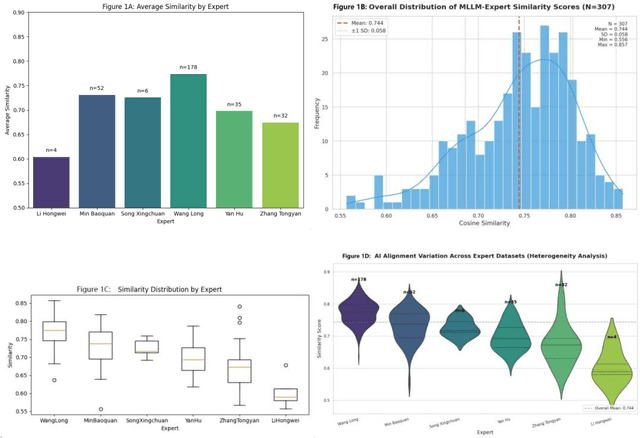
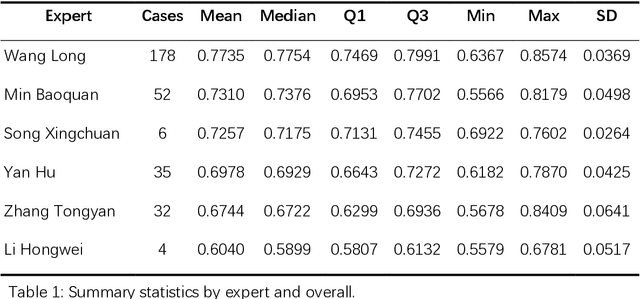
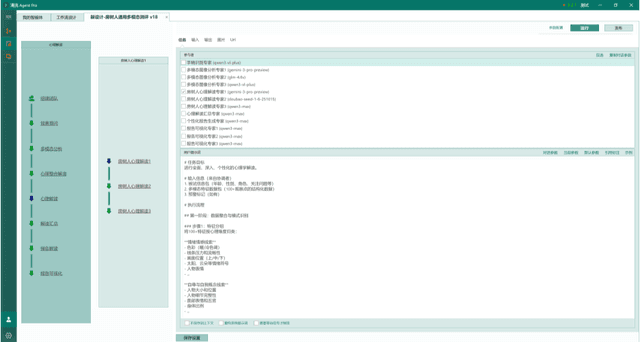
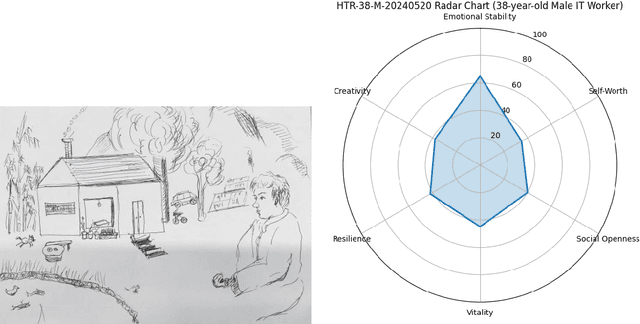
Abstract:Background: The House-Tree-Person (HTP) drawing test, introduced by John Buck in 1948, remains a widely used projective technique in clinical psychology. However, it has long faced challenges such as heterogeneous scoring standards, reliance on examiners subjective experience, and a lack of a unified quantitative coding system. Results: Quantitative experiments showed that the mean semantic similarity between Multimodal Large Language Model (MLLM) interpretations and human expert interpretations was approximately 0.75 (standard deviation about 0.05). In structurally oriented expert data sets, this similarity rose to 0.85, indicating expert-level baseline comprehension. Qualitative analyses demonstrated that the multi-agent system, by integrating social-psychological perspectives and destigmatizing narratives, effectively corrected visual hallucinations and produced psychological reports with high ecological validity and internal coherence. Conclusions: The findings confirm the potential of multimodal large models as standardized tools for projective assessment. The proposed multi-agent framework, by dividing roles, decouples feature recognition from psychological inference and offers a new paradigm for digital mental-health services. Keywords: House-Tree-Person test; multimodal large language model; multi-agent collaboration; cosine similarity; computational psychology; artificial intelligence
Modality Alignment across Trees on Heterogeneous Hyperbolic Manifolds
Oct 31, 2025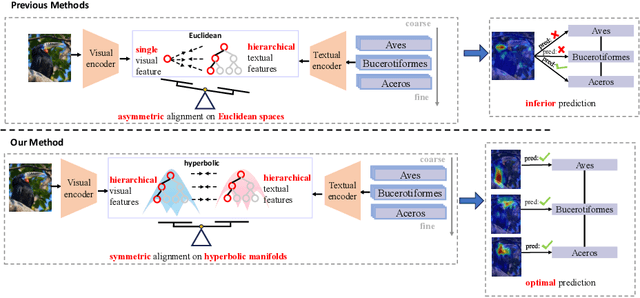
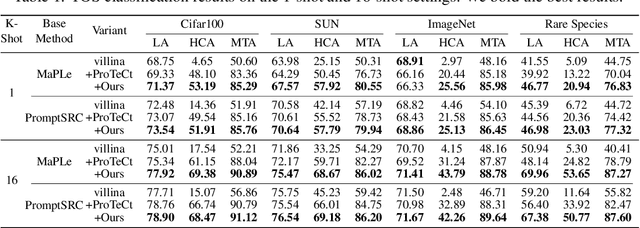
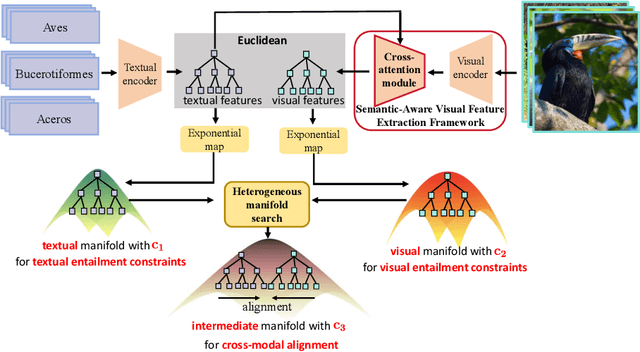

Abstract:Modality alignment is critical for vision-language models (VLMs) to effectively integrate information across modalities. However, existing methods extract hierarchical features from text while representing each image with a single feature, leading to asymmetric and suboptimal alignment. To address this, we propose Alignment across Trees, a method that constructs and aligns tree-like hierarchical features for both image and text modalities. Specifically, we introduce a semantic-aware visual feature extraction framework that applies a cross-attention mechanism to visual class tokens from intermediate Transformer layers, guided by textual cues to extract visual features with coarse-to-fine semantics. We then embed the feature trees of the two modalities into hyperbolic manifolds with distinct curvatures to effectively model their hierarchical structures. To align across the heterogeneous hyperbolic manifolds with different curvatures, we formulate a KL distance measure between distributions on heterogeneous manifolds, and learn an intermediate manifold for manifold alignment by minimizing the distance. We prove the existence and uniqueness of the optimal intermediate manifold. Experiments on taxonomic open-set classification tasks across multiple image datasets demonstrate that our method consistently outperforms strong baselines under few-shot and cross-domain settings.
GUI Knowledge Bench: Revealing the Knowledge Gap Behind VLM Failures in GUI Tasks
Oct 30, 2025Abstract:Large vision language models (VLMs) have advanced graphical user interface (GUI) task automation but still lag behind humans. We hypothesize this gap stems from missing core GUI knowledge, which existing training schemes (such as supervised fine tuning and reinforcement learning) alone cannot fully address. By analyzing common failure patterns in GUI task execution, we distill GUI knowledge into three dimensions: (1) interface perception, knowledge about recognizing widgets and system states; (2) interaction prediction, knowledge about reasoning action state transitions; and (3) instruction understanding, knowledge about planning, verifying, and assessing task completion progress. We further introduce GUI Knowledge Bench, a benchmark with multiple choice and yes/no questions across six platforms (Web, Android, MacOS, Windows, Linux, IOS) and 292 applications. Our evaluation shows that current VLMs identify widget functions but struggle with perceiving system states, predicting actions, and verifying task completion. Experiments on real world GUI tasks further validate the close link between GUI knowledge and task success. By providing a structured framework for assessing GUI knowledge, our work supports the selection of VLMs with greater potential prior to downstream training and provides insights for building more capable GUI agents.
KORE: Enhancing Knowledge Injection for Large Multimodal Models via Knowledge-Oriented Augmentations and Constraints
Oct 22, 2025Abstract:Large Multimodal Models encode extensive factual knowledge in their pre-trained weights. However, its knowledge remains static and limited, unable to keep pace with real-world developments, which hinders continuous knowledge acquisition. Effective knowledge injection thus becomes critical, involving two goals: knowledge adaptation (injecting new knowledge) and knowledge retention (preserving old knowledge). Existing methods often struggle to learn new knowledge and suffer from catastrophic forgetting. To address this, we propose KORE, a synergistic method of KnOwledge-oRientEd augmentations and constraints for injecting new knowledge into large multimodal models while preserving old knowledge. Unlike general text or image data augmentation, KORE automatically converts individual knowledge items into structured and comprehensive knowledge to ensure that the model accurately learns new knowledge, enabling accurate adaptation. Meanwhile, KORE stores previous knowledge in the covariance matrix of LMM's linear layer activations and initializes the adapter by projecting the original weights into the matrix's null space, defining a fine-tuning direction that minimizes interference with previous knowledge, enabling powerful retention. Extensive experiments on various LMMs, including LLaVA-v1.5-7B, LLaVA-v1.5-13B, and Qwen2.5-VL-7B, show that KORE achieves superior new knowledge injection performance and effectively mitigates catastrophic forgetting.
Beyond the Seen: Bounded Distribution Estimation for Open-Vocabulary Learning
Oct 06, 2025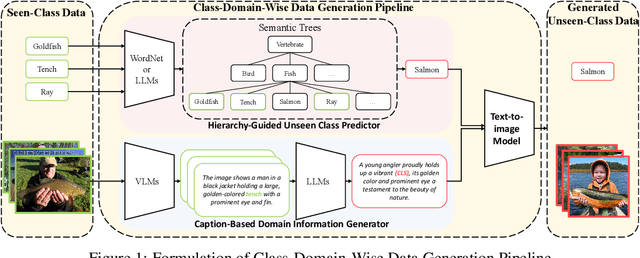
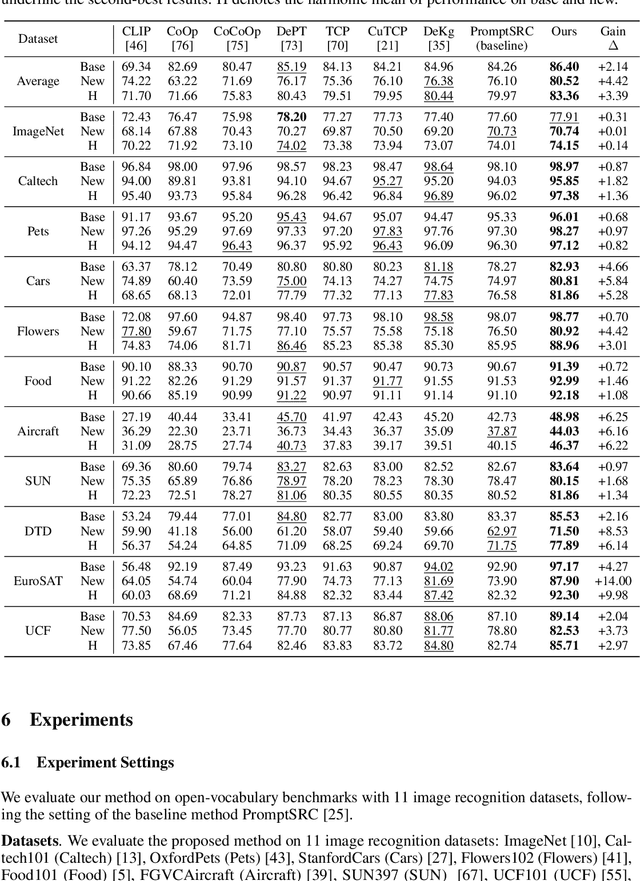
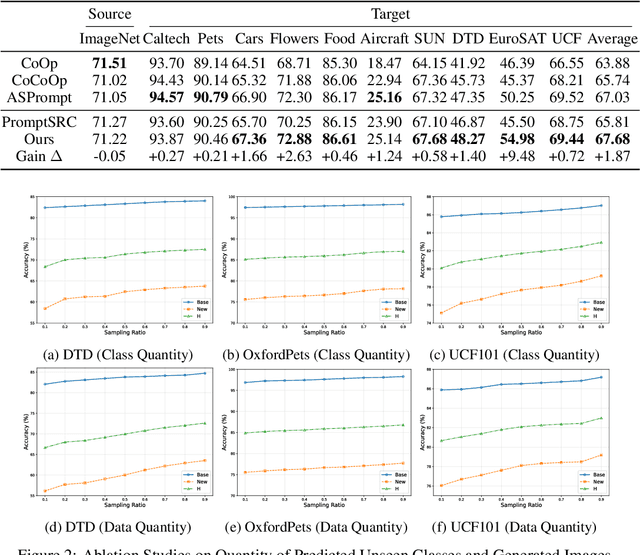
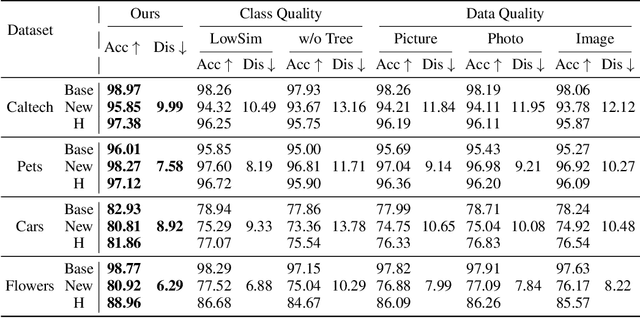
Abstract:Open-vocabulary learning requires modeling the data distribution in open environments, which consists of both seen-class and unseen-class data. Existing methods estimate the distribution in open environments using seen-class data, where the absence of unseen classes makes the estimation error inherently unidentifiable. Intuitively, learning beyond the seen classes is crucial for distribution estimation to bound the estimation error. We theoretically demonstrate that the distribution can be effectively estimated by generating unseen-class data, through which the estimation error is upper-bounded. Building on this theoretical insight, we propose a novel open-vocabulary learning method, which generates unseen-class data for estimating the distribution in open environments. The method consists of a class-domain-wise data generation pipeline and a distribution alignment algorithm. The data generation pipeline generates unseen-class data under the guidance of a hierarchical semantic tree and domain information inferred from the seen-class data, facilitating accurate distribution estimation. With the generated data, the distribution alignment algorithm estimates and maximizes the posterior probability to enhance generalization in open-vocabulary learning. Extensive experiments on $11$ datasets demonstrate that our method outperforms baseline approaches by up to $14\%$, highlighting its effectiveness and superiority.
Curvature Learning for Generalization of Hyperbolic Neural Networks
Aug 24, 2025Abstract:Hyperbolic neural networks (HNNs) have demonstrated notable efficacy in representing real-world data with hierarchical structures via exploiting the geometric properties of hyperbolic spaces characterized by negative curvatures. Curvature plays a crucial role in optimizing HNNs. Inappropriate curvatures may cause HNNs to converge to suboptimal parameters, degrading overall performance. So far, the theoretical foundation of the effect of curvatures on HNNs has not been developed. In this paper, we derive a PAC-Bayesian generalization bound of HNNs, highlighting the role of curvatures in the generalization of HNNs via their effect on the smoothness of the loss landscape. Driven by the derived bound, we propose a sharpness-aware curvature learning method to smooth the loss landscape, thereby improving the generalization of HNNs. In our method, we design a scope sharpness measure for curvatures, which is minimized through a bi-level optimization process. Then, we introduce an implicit differentiation algorithm that efficiently solves the bi-level optimization by approximating gradients of curvatures. We present the approximation error and convergence analyses of the proposed method, showing that the approximation error is upper-bounded, and the proposed method can converge by bounding gradients of HNNs. Experiments on four settings: classification, learning from long-tailed data, learning from noisy data, and few-shot learning show that our method can improve the performance of HNNs.
Hyperbolic Dual Feature Augmentation for Open-Environment
Jun 10, 2025Abstract:Feature augmentation generates novel samples in the feature space, providing an effective way to enhance the generalization ability of learning algorithms with hyperbolic geometry. Most hyperbolic feature augmentation is confined to closed-environment, assuming the number of classes is fixed (\emph{i.e.}, seen classes) and generating features only for these classes. In this paper, we propose a hyperbolic dual feature augmentation method for open-environment, which augments features for both seen and unseen classes in the hyperbolic space. To obtain a more precise approximation of the real data distribution for efficient training, (1) we adopt a neural ordinary differential equation module, enhanced by meta-learning, estimating the feature distributions of both seen and unseen classes; (2) we then introduce a regularizer to preserve the latent hierarchical structures of data in the hyperbolic space; (3) we also derive an upper bound for the hyperbolic dual augmentation loss, allowing us to train a hyperbolic model using infinite augmentations for seen and unseen classes. Extensive experiments on five open-environment tasks: class-incremental learning, few-shot open-set recognition, few-shot learning, zero-shot learning, and general image classification, demonstrate that our method effectively enhances the performance of hyperbolic algorithms in open-environment.
 Add to Chrome
Add to Chrome Add to Firefox
Add to Firefox Add to Edge
Add to Edge